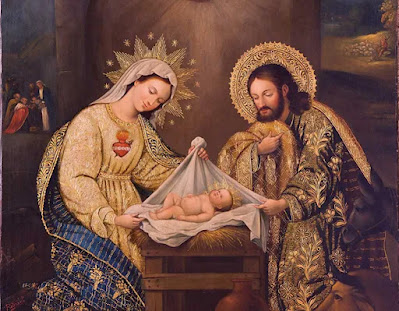Homilía: La Solemnidad de la Navidad del Señor
Hermanos, qué alegría es celebrar esta
gran fiesta con todos ustedes mientras declaramos con nueva alegría y fervor
que Cristo nuestro Rey ha nacido y, por lo tanto, que nos ha llegado la
salvación de las tinieblas eternas del pecado y de la muerte. Nos hemos estado
preparando para este día durante las últimas cuatro semanas, ¡cuatro semanas
completas!, y con razón: cuando se va a llevar a cabo una gran celebración, hay
mucho que hacer para prepararse.
Por lo tanto, antes de continuar,
siento que debo hacer una confesión. Cuando se trata de todo el bombo publicitario
y el acenso gradual de Navidad, soy un cascarrabias. El Adviento es un tiempo
que espero y lo espero porque es una invitación a bajar el ritmo, a estar un
poco más quietos, a reflexionar y a empezar de nuevo. Sin embargo, todos los
años, la temporada se llena de luces, música navideña y la presión de hacer más
cosas. Cada año, espero que este sea diferente y cada año me decepciona que el
mundo no haya decidido ajustarse a mi idea de Adviento ("¡Qué grosero!",
¿verdad?).
Estoy decepcionado, también, porque
siempre tengo grandes esperanzas de estar más listo y más preparado para la
Navidad, esperanzas que, aunque a veces poco realistas, casi nunca resultan
como las imaginé. Ese tiempo extra en oración que esperaba pasar fue difícil de
tomar y, cuando lo tomé, resultaba infructuoso. Esa idea creativa de regalos
para mi familia resultó ser demasiado lenta para llevarla a cabo. ¿Tarjetas
navideñas? Sí, lo pensé... mucho... durante como tres semanas... y todavía no
los envié. Después de cuatro semanas de decepción, frecuentemente me encuentro
cerca de Navidad sintiéndome un poco… digamos… malhumorado.
La cosa encima de todo para mí es que
siempre quiero estar bien preparado espiritualmente para celebrar este gran día
festivo, y ser malhumorado no lo hace fácil. Como la mayoría de ustedes,
supongo, me tomo el tiempo de hacer un buen examen de conciencia para hacer una
buena confesión durante el Adviento. Sin embargo, por más que trato de llevar
mi alma en un estado prístino de gracia a la celebración de la Navidad, para
hacer de mi corazón un hermoso regalo para Jesús en su cumpleaños, casi siempre
encuentro que fracaso; y así mi corazón, queriendo siempre enaltecerse de
alegría en esta celebración, está oprimido por el peso de mis pecados. Estoy
avergonzado de que, además de todas las otras cosas que no me salieron bien en
el Adviento, no pude hacer este mínimo por Jesús.
Con esto en el corazón, volví a
reflexionar sobre este pasaje del Evangelio que acabamos de escuchar y un rayo de
esperanza me llamó la atención. Allí dice: “En aquella región había unos
pastores que pasaban la noche en el campo, vigilando por turno sus rebaños”.
Estos pastores recibieron la impactante y desorientadora visita del ángel de
Dios que les trajo la buena noticia de que había nacido el tan esperado Mesías.
A ellos, los pastores que “viven en los campos y vigilan el rebaño de noche”,
se les dio instrucciones sobre cómo identificarían a este niño, el Cristo Rey,
que había nacido. Luego fueron a
buscarlo para rendirle homenaje.
“¿Por qué es esto un rayo de
esperanza?” podría preguntar. Estos pastores estaban viviendo en los campos,
cuidando el rebaño cuando recibieron esta buena noticia y fueron a buscar a
este Rey recién nacido. Supongo que no se detuvieron en casa para ducharse
antes de encontrarlo. Vinieron a él tal como eran; sucios de su trabajo en el
campo y con el olor de las ovejas pegado a ellos. Vinieron a ofrecerle su
homenaje y la Sagrada Familia los recibió sin queja ni condenas (¡después de
todo, estaban en un establo!). Regresaron a sus campos regocijándose de que
esta familia real los hubiera recibido, en toda su suciedad e imperfección. La
esperanza que sentí, y aún siento, es que Jesús nuestro Rey está igualmente
dispuesto hoy a recibirme a mí y a mi homenaje, en toda mi suciedad e
imperfección, de manera similar: sin queja ni condenación, solo alegría de que,
en mi devoción, he venido.
Hermanos, con demasiada frecuencia
pensamos que solo podemos venir a Jesús si estamos perfectamente limpios y
ordenados. ¡Ciertamente, este es un ideal por el cual debemos luchar! Sin
embargo, lo más importante que debemos recordar hoy es que Jesús quiere que nos
acerquemos a él, independientemente: incluso en nuestra suciedad e
imperfección. Esto es difícil, porque a menudo nos avergonzamos de nuestros
fracasos. No te preocupes, él nos ve. No se avergonzó de haber nacido en una
cueva entre ganado. Por lo tanto, no se va a ofender si nos acercamos a él con
el pecado en la conciencia, pero con amor en el corazón y un humilde deseo de
rendirle homenaje.
Acerquémonos, pues, a él en nuestras
imperfecciones y ofrezcámoslas como nuestro don, porque al hacerlo le estamos
ofreciendo nuestro más verdadero ser. Les aseguro que Jesús se deleita en este
regalo. A cambio de este signo de humilde devoción, nos dará su verdadero ser,
que es vida, y luz, y la paz de sabernos amados por el Dios que nos creó y que
está cerca de nosotros también ahora. Por tanto, venid todos los fieles; venid
y adorémosle.
Dado en la parroquia de
Nuestra Señora del Carmen: Carmel, IN
24 de diciembre, 2022
Dado en la parroquia de
San Jose: Delphi, IN – 25 de diciembre, 2022

